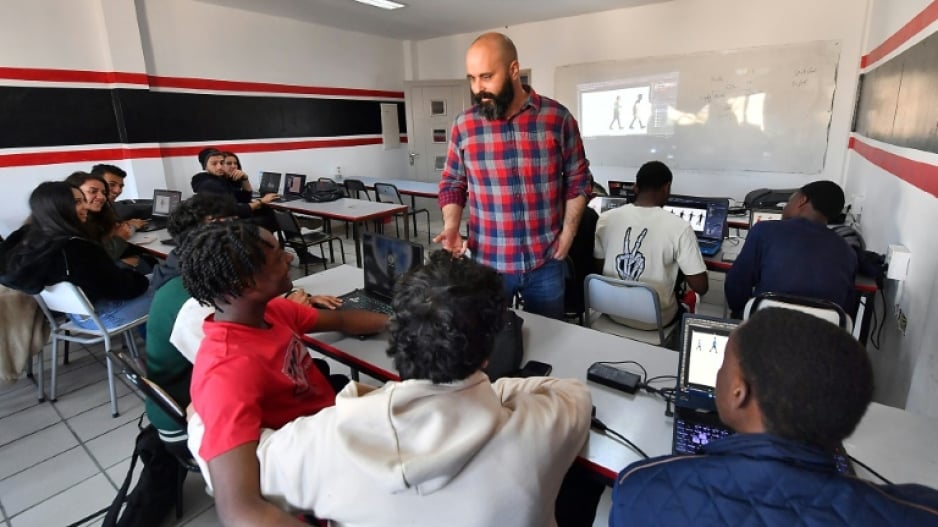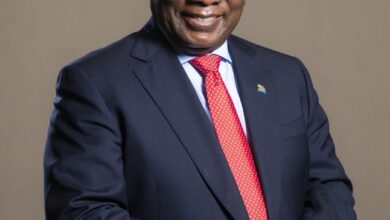
Thousands of sub-Saharan African students in Tunisia are still fearful after a surge of racist attacks following comments by President Kais Saied against illegal immigration and are seeking concrete steps to protect them.
The violence erupted after Saied blamed “hordes of illegal migrants from sub-Saharan Africa” for most crime in Tunisia and alleged there was a “criminal plot” to change the nation’s demographic makeup.
At the height of the wave of attacks last month, the “feeling of fear was overwhelming,” said Christian Kwongang, president of AESAT, an association representing sub-Saharan African students in Tunisia.
Amid what witnesses described as a “hunt for blacks”, Kwongang recalled that “we had parents in tears who called us, worried about their children being arrested, with some detained for up to two weeks”.
At the height of the attacks, the ‘feeling of fear was overwhelming,’ said Christian Kwongang, head of an association representing sub-Saharan African students in Tunisia
Kwongang said his group documented more than 20 assaults against students, “including 10 with knives”, and over 400 arrests. For more than two weeks it advised students to stop attending classes and only venture outside in case of emergency.
At least 100 students made emergency repatriations, mostly to Mali, Ivory Coast, Guinea and Niger, said Kwongang, who comes from Cameroon.
“They left because of the wave of racism, arbitrary arrests and numerous cases of evictions” from housing, Kwongang said.
The violence has abated and students returned to classes on March 6. No physical attacks have been recorded since March 7, but “verbal attacks” persist and the foreign students remain on guard, said Kwongang.
“We are in the observation phase,” he said. “And we are waiting to see concrete things — for example, an acceleration in the granting of residence permits.”
Tunisia’s President Kais Saied Saied blamed ‘hordes of illegal migrants from sub-Saharan Africa’ for most crime in the country
POOL/AFP/File | JOHANNA GERON
The violence was a “disaster for Tunisia”, which had always been “a welcoming place”, said Tahar Ben Lakhdar, director of the private ESPRIT university.
Saied’s comments represent “an enormous smear”, said the 83-year-old, who stressed that they were also entirely unjustified because “which country does not have foreigners in irregular situations?”
Some educational institutions have since implemented new protective measures — including setting up crisis units, bus transport, and having local students accompany sub-Saharan African students.
Lakhdar said ESPRIT, which specialises in engineering and management courses, has 350 sub-Saharan Africans among its 14,000 students.
Migrants arrive at Tunis-Carthage International airport on March 7, 2023 as they prepare to leave Tunis on a repatriation flight
He said the university had established “a platform where each student who has a problem can report to dedicated lawyers”.
The government of the North African country has also promised to address the problem.
Malek Kochlef, the Ministry of Higher Education’s director of international coordination, said that “there were some very reprehensible attacks” but claimed that “they were isolated acts”.
He told AFP the ministry had responded by establishing communication units and contact points in each educational establishment to report any incidents.
Authorities have also moved to begin streamlining the granting of residency permits and promised the creation an agency for the reception of foreign students, Kochlef added.
The violence could harm the private education sector in Tunisia, a small Mediterranean country suffering economic crisis, and deep political divisions since Saied in 2021 dismissed the government and assumed wide-ranging powers.
Sub-Saharan African students make up the “overwhelming majority” of international students in the private education sector and a “significant proportion” at public institutions, Kochlef said.
International student numbers in Tunisia, mostly from other African countries, grew to 9,000 last year, a five-fold increase since 2011.
Kwongang said there were 8,200 sub-Saharan African students at Tunisia’s universities and technical colleges at last count, in 2021.
Ivorian student Paul Andre Moa said Tunisia had long been seen as an “El Dorado, a welcoming land with an excellent education system”.
Thousands of sub-Saharan African students in Tunisia are seeking safety assurances from authorities in the aftermath of a spate of racist attacks which followed comments by President Kais Saied about illegal migration
It has attracted foreign students with favourable annual tuition fees starting at 3,000 euros (about $3,200), a much lower cost of living and less strict visa requirements than in Europe.
But Kwongang said that, after the announcement of measures to reassure students, AESAT members were now waiting to see what practical effect they will have.
He said students still faced close scrutiny from authorities and from police who are “one day asking for one document, the next day for another”.
Kwongang voiced “great concern” that enrolments will fall as many foreign students now hope to continue their studies “elsewhere, in Europe or Canada” and said he saw Tunisia’s reputation as “severely damaged”.
Source: AFP
In other news – Cyclone Freddy kills 15 in Malawi
At least 15 people have died in Malawi and Mozambique as Cyclone Freddy hit the two countries with torrential rains and strong winds, authorities said on Monday.
Police in Malawi said 11 people died in areas surrounding the southern city of Blantyre, where heavy rains triggered flooding. Learn More









